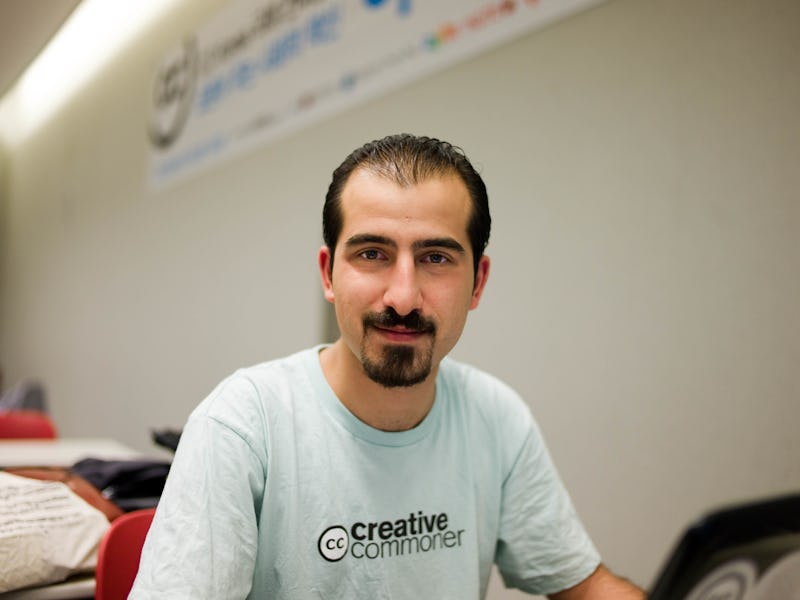Bassel Khartabil, Syrian-Palestinian Online Activist, Executed by Syrian Government
Khartabil, known for his work with Wikipedia and the Creative Commons, was missing for almost two years before news of his death broke.

Open-source developer and online activist Bassel Khartabil was executed in October 2015, according to a recent post by his wife. Late on Tuesday night, she confirmed her husband’s death via Facebook for the first time.
News of Khartabil’s death, formerly known as Bassel Safadi, elicited mournful responses from friends and colleagues, many of whom participated in the campaign for his release, #FreeBassel. He was first detained by Syrian authorities on March 15, 2012.
Though he was never officially made aware of the charges against him, it is believed that Khartabil’s successful efforts to increase internet accessibility within Syria were what led to his imprisonment. In a statement to the European Parliament that called for the parliament to seek Khartabil’s release, Ana Gomes and Charles Tannock asserted, “it is strongly suspected that his arrest was part of an effort to restrict access to online communities and discourses and stifle free expression in Syria.”
Bassel Khartabil (right) and friend, collaborator Jon Phillips.
Khartabil was known for his work as a frequent Wikipedia contributor, for working as the Creative Commons project leader in Syria, and for founding the Damascus-based hackerspace Aiki Lab. He was also placed on Foreign Policy’s list of Top 100 Global Thinkers in 2012 in honor of his influence in “fostering an open-source community in a country long on the margins of the internet’s youth culture.”
Khartabil’s last project, titled #NEWPALMYRA, is an open data reconstruction of the ancient Syrian city of Palmyra. Khartabil began working on a 3D rendering of Palmyra with a Syrian publisher in 2005, but the project was never released.
But after his imprisonment Khartabil’s interest in the project took on a new sense of urgency. “We were in discussions with Bassel through a number of letters about keeping this work alive,” Barry Threw, Khartabil’s close friend and the interim head of #NEWPALMYRA, said. “Particularly in light of the civil unrest across Syria, and began recovering the work we could and making plans for the relaunch of the project.”
Two coin purses that Khartabil made while in prison decorated with the Creative Commons logo.
“The actual relaunch of #NEWPALMYRA was predicated by two events in October of 2015: the “disappearing”, and we now know execution, of Bassel Khartabil by the Syrian regime,” Threw said. “And the capture and subsequent destruction of Palmyra by ISIS; making clear that the ruins were a symbolic battleground for control over the Syrian people #NEWPALMYRA is freeing Palmyra digitally to return agency over this cultural heritage to the Syrian and global communities, following Bassel’s visionary work of transparency, open internet, and free culture for the advancement of the Syrian people.”
A 3D printed model of the Tetrapylon of Palmyra that emerged from the project was first displayed at the Creative Commons Summit in April as a tribute to Khartabil.
For Khartabil, the project was not a political one.
“New Palmyra was fun for him,” Jon Phillips, another close friend and Khartabil’s co-collaborator on projects like Openclipart and Fontlibrary. “If you look at the history of the ruins, the things Creative Commons and Wikipedia stood for, remix in the virtual world, Palmyra is a living remix of history and cultures.”
Phillips spearheaded the #FreeBassel campaign, which launched in July 2012. “It became difficult to keep a spotlight on Bassel after a few years because his status was not changing,” he said. “And people get frustrated when there is no change.”
“From my perspective, there was a lot of press attention on Palmyra, so New Palmrya was a great way to shine more light onto Bassel’s plight.” Phillips said. “But now with the recent news, we realize it was all a little too late to save his life.”
A sample of the signage in the #FreeBassel campaign.
Khartabil was able to maintain contact with friends and family from February 2013 until October 2015. According to Phillips, family members were able to visit him during that period, and he communicated with friends via letters.
On October 3, 2015, Khartabil was removed from Adra Prison, a prison on the outskirts of Damascus. Although his supporters on the outside were not aware at the time, he was executed shortly after his removal. His wife, Noura Ghazi Safadi, first publicized rumors of Khartabil’s execution in November 2015, when they were passed on to her by people claiming to be Syrian government informants.
But these rumors did not curb efforts to free Khartabil. Prominent organizations like Creative Commons called for Khartabil’s release soon after his whereabouts became unknown, and Amnesty International issued an urgent action on his behalf.
Following news of his execution, Creative Commons issued a statement about Khartabil on Tuesday. “The global commons of art, history, and knowledge, are stronger because of Bassel’s contributions, and our community is better because of his work and his friendship,” it read.
Threw and Phillips both echoed these sentiments.
“Through his educational activities through the AIKILab hackerspace he founded, his work in establishing Creative Commons in the Middle East, his cultural heritage work, and work on open platforms,” Threw said. “He tirelessly worked to advance free knowledge and opportunities for the Syrian people through innovation.”
“Bassel was the Steve Jobs that was not lifted up by his culture,” Phillips said.
You can donate to Bassel Khartabil’s memorial fund here.